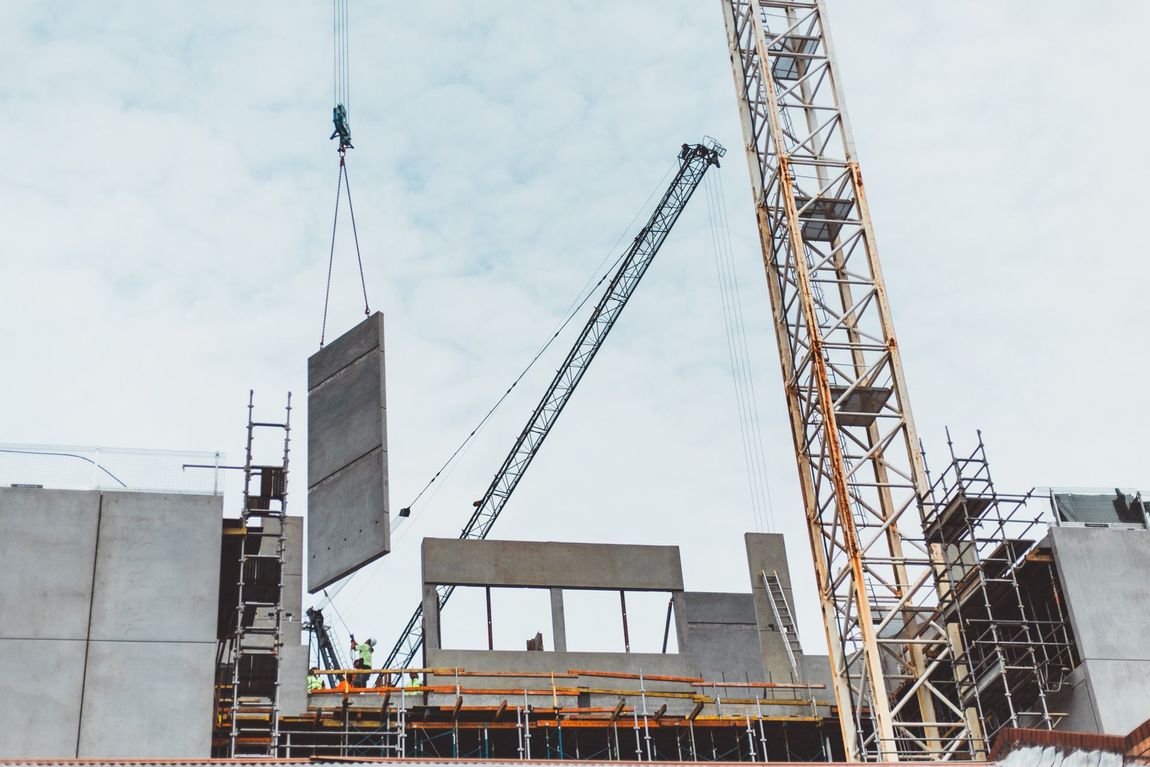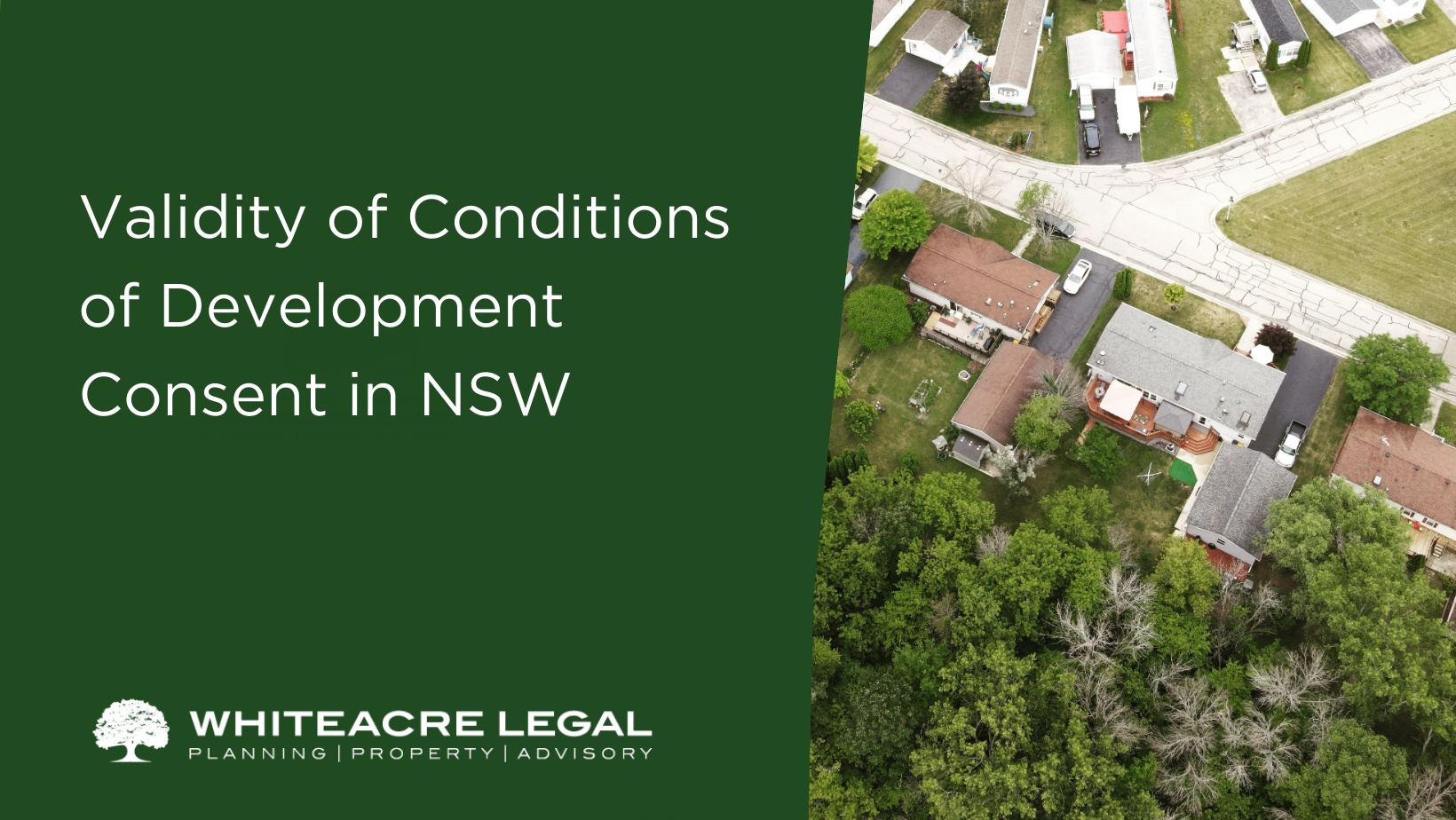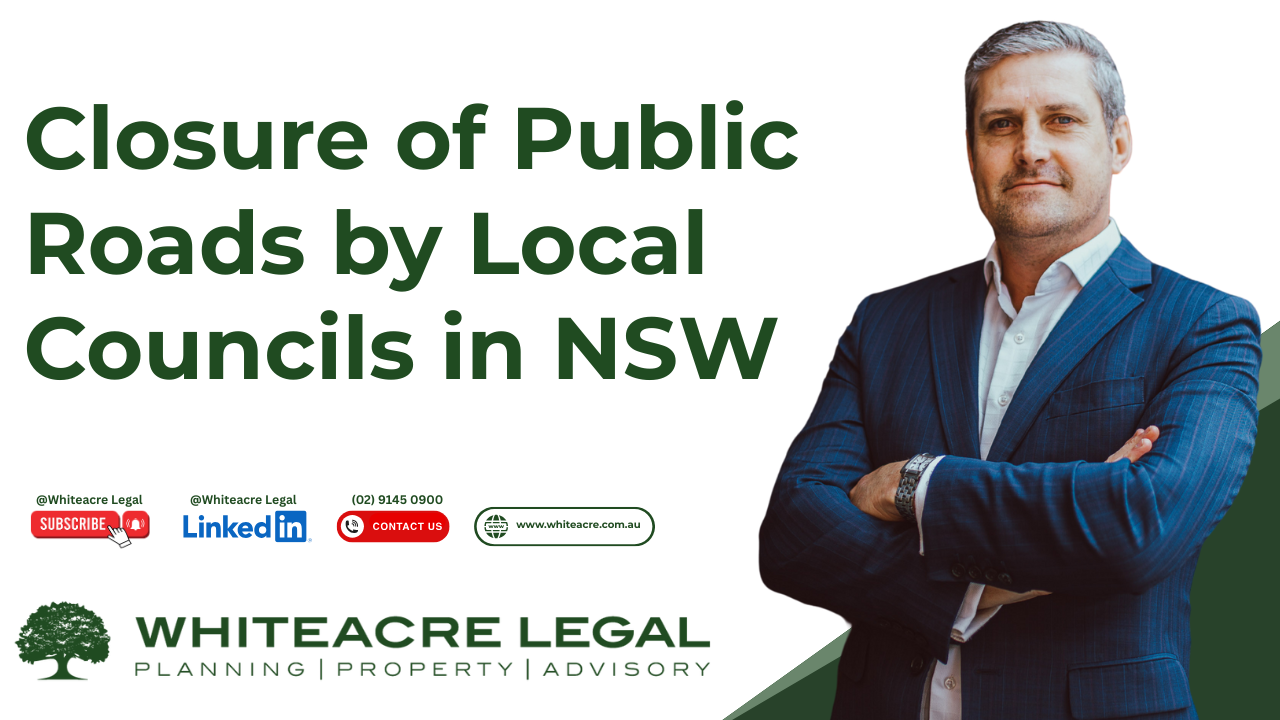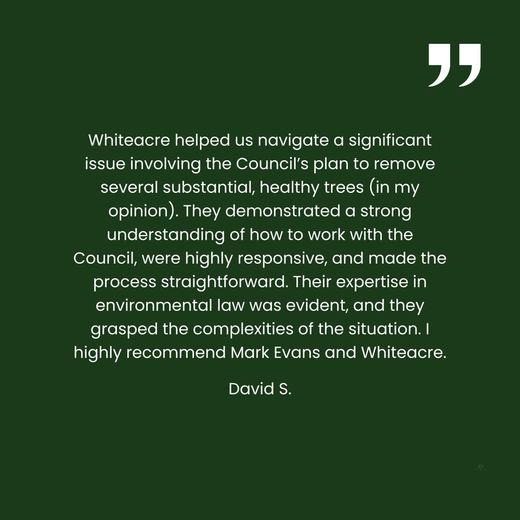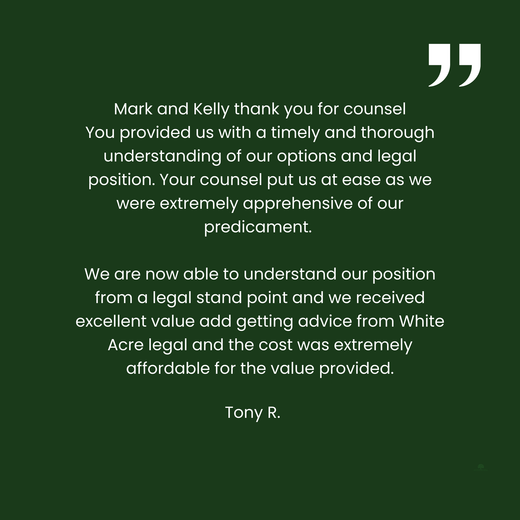By Mark Evans
•
December 11, 2025
We explore this topic first by unpacking some fundamental principles and then by reviewing recent cases in which these issues have been examined. Introduction The starting point in understanding the scope of rights granted by an easement must always be the express terms of the easement: Westfield Management Ltd v Perpetual Trustee Company Ltd [2007] MCA 45. In the case of a right of carriageway, those terms will typically, but not always, be the standard terms from the Conveyancing Act 1919 which are: The terms are: Full and free right for every person who is at any time entitled to an estate or interest in possession in the land herein indicated as the dominant tenement or any part thereof with which the right shall be capable of enjoyment, and every person authorised by that person, to go, pass and repass at all times and for all purposes with or without animals or vehicles or both to and from the said dominant tenement or any such part thereof. The express terms of the easement extend to the dominant owners and persons authorised by them to pass across the burdened land at all times and for all purposes. However, while the terms of the right of carriageway may be wide in scope, as a general principle an easement should be limited to that which is reasonably necessary for the effective and reasonable exercise and enjoyment of the easement: Zenere v Leate (1980) 1 BPR 9300 (McLelland J); Prospect County Council v Cross (1990) 21 NSWLR 601 per Bryson J at 607-608; Butler v Muddle (1995) 6 BPR 13,984; [1996] ANZ ConvR 147; (1995) NSW ConvR 55-745 (Young J); Burke v Frasers Lorne Pty Ltd [2008] NSWSC 988 per Brereton J at [22]. Right to build must be reasonably necessary. The grant of an easement conveys with it all ancillary rights to the owner of the benefited land that are reasonably necessary for the exercise and enjoyment of that easement. But what is reasonably necessary? Well, it is generally accepted that the owner of the benefited land is entitled to construct a road over the site of a right of carriageway if a road or paving is necessary to use the easement: N ewcomen v Coulson (1877) LR 5 Ch D 133, 143-4 (Jessel MR); Mills v Silver [1991] Ch 271, 286-7 (Dillon LJ); Gerrard v Cooke (1806) 2 Bos & Pul (NR) 109; (1806) 127 ER 565 ; Senhouse v Christian (1787) 1 Term Rep 560; (1787) 99 ER 1251 ; Zenere v Leate (1980) 1 BPR 9300 (McLelland J); Butler v Muddle (1995) 6 BPR 13,984; [1996] ANZ ConvR 147; (1995) NSW ConvR 55-745 (Young J); Kirkjian v Towers (NSWSC, Waddell CJ in Eq, 6 July 1987, unreported); Sertari Pty Ltd v Nirimba Developments Pty Ltd [2007] NSWCA 324 (Handley AJA) at [9] . This is a right of the owner of the benefited land that is ancillary to the right of carriageway. The owner of the benefited land may enter onto the burdened land to do that which is reasonably necessary to make the grant effective – including, in the case of a right of carriageway, not only repairing it but making a road so that there is a serviceable carriageway over which vehicles can pass in poor conditions as well as in good weather. The extent of the rights to do so will turn on what is reasonably necessary in the circumstances for the dominant owner’s enjoyment of its express rights under the easement. Each circumstance is different and merely because what is proposed does not substantially interfere with the servient owner’s rights does not necessarily mean that it is reasonably necessary. In Butler v Muddle (1995) 6 BPR 13,984, at 13,986, Young J noted the “general proposition that a right of way is not the equivalent of ownership”. His Honour then explained (at 13,987, citations omitted): “... it was said that where one had a right of carriageway one could pave so that the wheels of one’s carriage did not sink into the ground. But none of that authority gives any licence to the dominant owner to pave the whole of the right of way. His right is only to pave so much as is reasonably necessary for his enjoyment.” Similarly, Bryson J said in Owners Corp of Strata Plan 42472 v Menala Pty Ltd (1998) 9 BPR 16,337 at 16,340: “The [dominant owner’s] right of way does not entitle the [dominant owner] to have the whole of the 6 m strip cleared of any obstruction as if it were a billiard table. The [servient owner] continues to be the owner of [its] land, and may use it in any way and maintain on it any structure if it does not create a real substantial interference with the enjoyment of the right of way. If enough space is left free for passage without any real substantial interference with the right to pass and re-pass, the [dominant owner] cannot insist on more.” From these cases one might conclude that paving so much of the right of way as is reasonably necessary is acceptable, while paving the entire width of the right of way and levelling the land to a billiard table may not. Can the burdened land still be used but it’s owner? Yes, within reason. The owner of the burdened land retains, in respect of the burdened land, all those rights of ownership that are not inconsistent with the exercise by the dominant owner of the rights expressly given or implicitly confirmed by the grant: Zenere v Leate (1980) 1 BPR 9300 (McLelland J); Prospect County Council v Cross (1990) 21 NSWLR 601; Moncrieff v Jamieson [2007] UKHL 42; [2007] 1 WLR 2620 per Lord Scott at [54]. This does not mean, however that where the two competing land uses are incompatible, the owner of the benefited land must sacrifice use of the right of carriageway. “… a servient owner’s rights are diminished to the extent that they are inconsistent with reasonable exercise by the dominant owner of its rights.”: Burke v Frasers Lorne Pty Ltd [2008] NSWSC 988 per Brereton J at [23]. As Lord Scott said in Moncrieff v Jamieson [2007] UKHL 42; [2007] 1 WLR 2620 at [54], in terms quoted approvingly by the NSW Court of Appeal in Theunissen v Barter [2025] NSWCA 50 at [132]: “Every servitude or easement will bar some ordinary use of the servient land. For example, a right of way prevents all manner of ordinary uses of the land over which the road passes. The servient owner cannot plough up the road. He cannot grow cabbages on it or use it for basketball practice.” Each owner has rights that must be accommodated by the other. This principle was explained by Barrett JA in Hare v van Brugge (2013) 84 NSWLR 41; [2013] NSWCA 74 at [25]: “It may readily be accepted that a concept of reasonable use applies. But it applies to both parties. Each of them — the servient owner and the dominant owner — must exercise a degree of restraint in relation to an easement site. Neither may exercise his or her rights (the rights arising from the easement, in the case of the dominant owner, and the rights incidental to ownership of the burdened fee simple, in the case of the servient owner) in a way that interferes unreasonably with the enjoyment of the other’s rights. …” What if there are a number of means of enjoying the easement? Where an easement permits the exercise of the rights granted in numerous ways, generally the owner of the benefited land is entitled to choose the manner of its exercise, and even to change that use from time to time. Consider a circumstance where there are multiple points from which access might be had from a right of way into the benefited land. In those circumstances, the owner of the benefited land is entitled to select a reasonable number of points for that access, and even to change those points of access from time to time: Trewin v Felton [2007] NSWSC 851 per Brereton J at [19]; Butler v Muddle (1995) 6 BPR 13,984; [1996] ANZ ConvR 147; (1995) NSW ConvR 55-745 (Young J); Chiu v Healey [2003] NSWSC 857; Burke v Frasers Lorne Pty Ltd [2008] NSWSC 988 per Brereton J at [24]. Can the owner of the burdened land withhold consent? When building a road over the burdened land, particularly in rural areas, development consent may be required. If the proposed works are being carried out on the burdened land, the consent of the owner of the burdened land to the application for development consent will be required. Without owner’s consent, the development consent cannot be granted: Al Maha Pty Ltd v Huajun Investments Pty Ltd [2018] NSWCA 245; 365 ALR 86 . In Kirkjian v Towers (6/7/87 u/r) Waddell CJ in Eq held that the owner of the burdened land could be ordered to consent to the lodgement of a development application for construction of improvements which are reasonably necessary for the proper enjoyment of the easement. That decision has been followed: 117 York Street Pty Ltd v Proprietors of Strata Plan No 16123 (1998) 43 NSWLR 504, 521-2 ; Owners Strata Plan No 50411 v Cameron North Sydney Investments Pty Limited [2003] NSWCA 5 para [23] per Giles JA and Sertari Pty Ltd v Nirimba Developments Pty Ltd [2007] NSWCA 324. The owner of the burdened land may withhold its consent to the application for development consent where the proposed works are unlawful or an excessive user of the easement. For commentary on what may constitute excessive user refer below to the case summary of Sertari Pty Ltd v Nirimba Developments Pty Ltd [2007] NSWCA 324. Case law on construction within an easement site The following case summaries help in understanding the principles above. Burke v Frasers Lorne Pty Ltd [2008] NSWSC 988 In Burke v Frasers Lorne Mrs Burke and other neighbours enjoyed a right of carriageway over property owned by Frasers Lorne. Frasers Lorne replaced the asphalt on a driveway within the carriageway located on its property with turf. The plaintiffs, including Mrs Burke brought proceedings against Frasers Lorne to reinstate the asphalt driveway. A question arose regarding the right of the owner of the burdened land (Frasers Lorne) to replace the surface material of the driveway on its land. At [27] Brereton J held that, even though the turf driveway still afforded reasonable access to the benefited properties, Frasers Lorne has substituted the asphalt driveway for something which was inferior. Frasers Lorne submitted that the real question was whether the alternative substituted by Frasers Lorne would still afford reasonable access in accordance with the terms of the easement. If it did, then Frasers Lorne had a right to install the alternative, Brereton J held at [28]: “Attractive as this submission so stated is, I am, nonetheless, convinced it is wrong for the following reasons. First, it would be inconsistent with the right of the dominant owner to construct a carriageway on the site of the easement, if, the dominant owner having constructed a carriageway which was not excessive, the servient owner could unilaterally disrupt that carriageway and substitute an inferior one, even though it would still afford reasonable access. The right to construct a carriageway must include, for example, the right to select the contractor who will build it, the right to select the particular form of paving which will be used, and so on. It would make nonsense of this right if the servient owner could then decide that he or she did not like the particular form of paving and substitute an inferior one.” And at [33]: “In my judgment, therefore, and absent any special provision in the grant, a servient owner is not entitled unilaterally to change the surface of the carriageway to an inferior one, or otherwise to disrupt or degrade the surface of the carriageway. To do so would be inconsistent with the rights of the dominant owner to construct a carriageway to the extent reasonably necessary for the proper enjoyment of the grant (so long as the construction is a non-excessive user), and to enjoy access over the carriageway so constructed.” Accordingly, Brereton J concluded that Frasers Lorne had no right to change the surface of the driveway constructed within the carriageway on its land. To do so was inconsistent with the plaintiffs' right to have the constructed driveway over the right of carriageway remain in its current form. Sertari Pty Ltd v Nirimba Developments Pty Ltd [2007] NSWCA 324 In Sertari Pty Ltd v Nirimba , the owner of the burdened land subject to a registered right of carriageway (Sertari), refused to consent to a development application by the owner of the benefited land (Nirimba). Sertari’s consent had become necessary because Nirimba proposed to carry out development on the benefited land to build 236 apartments and underground parking for 351 vehicles. Access to the benefited land was via a driveway and carpark on the burdened land. The proposed development would greatly increase the traffic on the right of carriageway. The terms of the easement placed the whole burden of the maintenance and repair of the driveway on the owner of the burdened land. The trial Judge ordered Sertari to give its consent to the development application. Sertari appealed against that order to the NSW Court of Appeal. The NSW Court of Appeal (Handley AJA with whom Tobias JA and McColl JA agreed) held that the owner of the burdened land can be compelled to consent to a development application by the owner of the benefited land in respect of the burdened land where refusal to provide consent would obstruct the dominant owner in the exercise of its rights under the easement. The servient owner had no lawful reason for refusing its consent. Handley AJA held at [10]: “The servient owner's refusal of consent, where this is legally necessary, obstructs the dominant owner in the exercise of rights under the easement. Obstruction by legal means in this way is just as much an infringement of the dominant owner's rights as a direct physical obstruction.” in Kirkjian v Towers Waddell CJ in Eq held that the owner of the burdened land was bound to grant consent unless there was a "lawful reason" for refusing to do so. There was no such reason in that case because the proposed user of the right of way was not excessive. The right of carriageway was in the following terms: (a) Full and free right for every person who is at any time entitled to an estate or interest in possession in the land herein indicated as the dominant tenement or any part thereof with which the right shall be capable of enjoyment and every person authorised by him and lessees, employees, customers, patrons, invitees and licensees of any business conducted from the improvements erected or to be erected on the dominant tenement to go, pass along and re-pass at all times and for all purposes with or without animals and with or without vehicles or both to or from the said dominant tenement or any part thereof. (b) The site of the servient tenement shall be maintained and repaired by the registered proprietor thereof, which obligation shall bind his successors in title and assigns." At first instance, Windeyer J held that the words of the grant were clear and since it was a right for all purposes and at all times all persons connected with the proposed residential development were entitled to use the right of carriageway. In these circumstances the question of excessive user, which was essentially one of construction, could not arise. Windeyer J also held (at pghs [5], [37] - [41]) that the physical characteristics of the properties and the activities being conducted on the benefited land at the time of the grant of the easement could not cut down its plain words. Handley AJA at [16] followed the High Court’s decision in Westfield Management Ltd v Perpetual Trustee Company Ltd [2007] HCA 45 which required that the Court could only have reference to the material in the folio identifiers, the registered instrument, the deposited plans, and the physical characteristics of the properties but that these provided no basis for reading down the clear and unqualified words of the easement. The easement was for all purposes, for use at all times, and extended to every person with an estate or interest in any part of the benefited land with which the right was capable of enjoyment, and persons authorised by them. This meant that the benefit of the easement extended to each and every future owner of the proposed 236 apartment units. The owner of the burdened land submitted that the car park, including the pavement of the burdened land, had not been constructed to carry heavy traffic of this nature and the positive obligation to maintain the easement was likely to prove underly onerous. The traffic once the units were fully occupied would impose a heavy and permanent financial burden on the owner of the burdened land. His Honour Handley AJA held at [18]: “In my judgment this evidence cannot affect the construction of the clear words of the grant. The dominant tenement is very large, the servient tenement is very small, the use is for all purposes, and the whole burden of maintenance and repair is clearly imposed on the servient owner.” And at [20]: “I have already held that the proposed user would not be excessive. The apparently unfair financial burden that the increased use would place on the servient owner would be lawful and in these circumstances the appellant was bound to give its formal consent to the second development application.” The Court of Appeal held that, because the local council was nominated as the party with the power to release, vary or modify the terms of the easement, there was nothing to suggest that the local council could not impose conditions in the development consent that would fairly adjust the financial burdens created by the increased use of the burdened land. Further, it could be appropriate, at some stage, for the local council to modify the registered easement by incorporating the relevant conditions of consent so that those terms appear on the title. FitzGerald v Foxes Lane (NSW) Pty Ltd [2025] NSWCA 212 In FitzGerald v Foxes Lane, the NSW Court of Appeal held that the owner of farmland near Moree in northern New South Wales ( Mr Fitzgerald ) which had the benefit of a registered right of carriageway ( ROC ) over neighbouring farmland, was entitled to undertake work (light grading) on a five metre wide vehicular track along the ROC. The owner of the burdened land ( Foxes Lane ) was restrained from causing crops to be planted or for “tramlines” to be created or maintained within the ROC on the burdened land. The burdened land was previously used for grazing and a track mostly consisting of dirt compacted paths (for vehicle wheels) existed within the ROC. However, from around 2011, Foxes Lane began using the land for cropping. They planted crops across the ROC and employed a system of cultivation involving “tramline” ruts which affected the existing track’s surface. This made it difficult for Mr Fitzgerald to drive over the track and use the ROC. Mr Fitzgerald filed a summons in the NSW Supreme Court seeking injunctive relief concerning Foxes Lane’s farming activities within the ROC and declaratory relief relating to his plan to construct an unsealed crowned road over the existing track. The primary judge substantially rejected Mr Fitzgerald’s claims, holding that Foxes Lane was entitled to use the ROC in any way, including by cropping, provided that there was no substantial interference with Mr Fitgerald’s rights under the ROC. Further, it held that Mr Fitzgerald’s proposed road works were not reasonably necessary in circumstances where he had always been able to pass and repass along the ROC in his farm ute. Some of the issues to be determined on appeal were whether: Foxes Lane’s use of the ROC by cropping constituted a substantial interference with Mr Fitzgerald’s rights; and if so, what relief should issue and, relatedly, whether Mr Fitzgerald was entitled to undertake his proposed roadworks. Substantial interference With respect to interference by the planting of crops within the ROC and the tramlines, Kirk JA (with whom Adamson JA agreed) held at [99] that these amounted to a substantial interference with the use of the ROC. Specifically, the crops obscured the path of the ROC such that it was difficult to see and use and this was found to be a significant interference with the ability of Mr Fitzgerald and his guests to use the ROC. “As noted, whether or not there has been a substantial interference with the rights of the dominant owner involves a practical, evaluative judgment about neighbours being able to exercise their respective property rights, taking account of the nature, extent and significance of any interference. There was evidence that the ROC, like other tracks and roads in the area, could become boggy and potentially impassible in wet conditions…That the ROC had such inherent limitations is not an answer to the appellant’s complaints that the respondents’ actions in cropping over the ROC impeded its use by making it more difficult and risky for ordinary nonfarm vehicles, and petrol vehicles (whether used for farming or not), to drive over the ROC… In my view these effects of the respondents’ cropping activities represent a significant interference with the ability of the appellant and his invitees to use the ROC.” And at [115]: “The ROC did not require that the respondents only ever engage in grazing on Lot 10, as though the land use was frozen as at the time the right was created. But in changing use they could not ignore the right held by the dominant owner. As outlined above, the obscuring effect of the respondents’ cropping activities is a significant interference with the ability of the appellant and his invitees to make use of the ROC. The same is true of the increased difficulty and reduced speed of travelling on it, and the impediment placed on using non-farm vehicles or any vehicles using petrol engines. The potential for causing mechanical and physical problems with vehicles is also a factor of some (if lesser) weight. The combination of all such matters involves a substantial interference by the respondents in the rights held by the appellant.” Right to construct within the ROC At [73] Kirk JA restated the long-understood position that the ancillary right to construct a road within a right of carriageway turns on whether doing so was reasonably necessary for the dominant owner’s enjoyment of its express rights under the easement. Kirk JA, held at [69]-[70] that while the context of the ROC might be important, Mr Fitzgerald’s rights to use the ROC ought not to be limited to the use of the track in its current state or limited to the use by an “ordinary farm vehicle”. “There was some suggestion by the respondents that the ROC should be construed to extend to passage only by an “ordinary farm vehicle”, perhaps meaning 4WD vehicles. That issue overlaps with the practical question of the interaction of the parties’ rights in the current circumstances. Insofar as the point is put as a matter of construction it should be rejected. As the High Court said in Westfield Management Ltd v Perpetual Trustee Company Ltd (2007) 233 CLR 528; [2007] HCA 45 at [30] , “the term ‘for all purposes’ encompasses all ends sought to be achieved by those using the easement in accordance with its terms” (see also the authorities referred to at [64]). The respondents argued that “the purpose of the grant, assessed from the perspective of a reasonable person in the position of the parties to the grant, would have contemplated passage by ordinary farm vehicles, not a sports car”. However, as the appellant said in reply, the terms of the ROC are not limited to usage by farmers, and even farmers may use vehicles other than “usual farm vehicles”. Accordingly, the submission that the use of the ROC ought to be limited to farm vehicles was rejected. A similar argument was rejected by Habersberger J in Mantec Thoroughbreds Pty Ltd v Batur (2009) 25 VR 507; [2009] VSC 351: [74] One other circumstance that I consider should be taken into account is that the easement in question benefited a rural property. Thus, it must have been contemplated that the easement would be used in the ordinary course of farming activities, should it be needed. This would likely involve the movement of cattle or other stock, the driving of tractors, motorbikes and other machinery and access by car or utility vehicle. I see no reason why this should not also include the occasional large truck or semi-trailer. Trucks are clearly used in farming activities, and occasionally bringing a larger vehicle onto the land is not an unlikely occurrence. In addition, it must have been contemplated at the time that a house might be built on the newly subdivided lot 4. There seems to be no reason, therefore, why the easement of way does not extend to all forms of vehicular traffic and I so find.” With respect to the construction of a road within the ROC, Kirk JA held at [136] that Mr Fitzgerald had not established a sufficiently detailed and clear plan of the road he wished to build and had thus not established the reasonable necessity of building a road over the ROC. However, Kirk JA at [137] held that Mr Fitzgerald was entitled to undertake remediation of the existing track to make it trafficable: “However, the appellant is entitled to undertake remediation to the ROC to even out the tramlines that currently run across it. It is therefore appropriate to declare that the plaintiff may undertake work on a five metre wide vehicular track along the ROC in the nature of light grading or drag bucketing in order to even out the tramlines running across the track. Light grading would encompass the sort of work the appellant has previously undertaken by dragging an implement behind his ute.” Key Takeaways The owner of the benefited land is entitled to construct improvements on the burdened land where this is necessary or convenient for the exercise of the rights conferred by the easement: Sertari Pty Ltd v Nirimba Developments Pty Ltd [2007] NSWCA 324 per Handley AJA at [9]. The owner of the benefited land can pave so much of the right of way as is reasonably necessary for its use and enjoyment but not the entirety of the right of way or insist that if be as flat as a billiard table: Butter v Muddle (1995) 6 BPR 13,984; Owners Corp of Stata Plan 42472 v Merala Pty Ltd (1998) 9 BPR 16,377. The right to construct a carriageway must include, for example, the right to select the contractor who will build it, the right to select the particular form of paving which will be used, and so on: Burke v Frasers Lorne Pty Ltd [2008] NSWSC 988 per Brereton J at [28]. An owner of burdened land is not entitled to change the surface of the carriageway to an inferior one, or otherwise to disrupt or degrade the surface of the carriageway. To do so would be inconsistent with the rights of the dominant owner to construct a carriageway to the extent reasonably necessary for the proper enjoyment of the grant (so long as the construction is a non-excessive user), and to enjoy access over the carriageway so constructed: Burke v Frasers Lorne Pty Ltd [2008] NSWSC 988 per Brereton J at [33]. Where an easement permits the exercise of the rights granted in a number of different ways, generally the owner of the benefited land is entitled to choose the manner of its exercise, and even to change that use from time to time: Trewin v Felton [2007] NSWSC 851 per Brereton J at [19]; Butler v Muddle (1995) 6 BPR 13,984; [1996] ANZ ConvR 147; (1995) NSW ConvR 55-745 (Young J); Chiu v Healey [2003] NSWSC 857; Burke v Frasers Lorne Pty Ltd [2008] NSWSC 988 per Brereton J at [24]. The owner of burdened land can be required to consent to a development application by the dominant owner in respect of the burdened land where refusal to provide consent would obstruct the dominant owner in the exercise of its rights under the easement: Kirkjian v Towers (NSWSC, Waddell CJ in Eq, 6 July 1987, unreported); Sertari Pty Ltd v Nirimba Developments Pty Ltd [2007] NSWCA 324. The planting of crops and tramlines across a right of carriageway may constitute a real and substantial interference with the use of the right of carriageway and access across a farm track ought not be limited to 4wd farm vehicles only: Fitzgerald v Foxes Lane (NSW) Pty Ltd [2023] NSWCA 212. Require further assistance? We are often asked to provide advice on complex questions involving easements and ancillary rights. Often resolution of the issues can be a simple matter of engaging in constructive consultation with the parties involved or the local council, or alternatively, bringing the matter before the Court for determination. Disclaimer The contents of this article are a general guide and intended for educational purposes only. Determination of issues of the kind discussed in this article is often complex and varies greatly from case to case. Each individual case is different and requires a detailed understanding of matters of fact and degree upon which reasonable minds may differ. DO NOT RELY ON THIS ARTICLE AS A SUBSTITUTE FOR COMPETENT LEGAL ADVICE.
